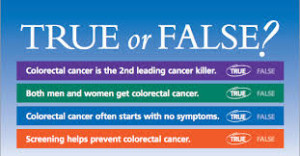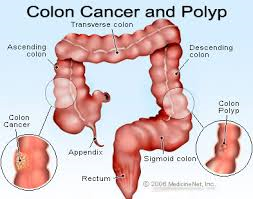Colorectal cancer is cancer that develops in the tissues of the colon and/or rectum. The colon and the rectum are both found in the lower part of the gastrointestinal (digestive) system. They form a long, muscular tube called the large intestine (or large bowel). The colon absorbs food and water and stores waste. The rectum is responsible for passing waste from the body.
If the cancer began in the colon, which is the first four to five feet of the large intestine, it may be referred to as colon cancer. If the cancer began in the rectum, which is the last several inches of the large intestine leading to the anus, it is called rectal cancer.
Colorectal cancer starts in the inner lining of the colon and/or rectum, slowly growing through some or all of its layers. It typically starts as a growth of tissue called a polyp. A particular type of polyp, called an adenoma, can then develop into cancer.
Adenocarcinoma is the most common type of colorectal cancer. Other colorectal cancers include gastrointestinal carcinoid tumors, gastrointestinal stromal tumors, primary colorectal lymphoma, leiomyosarcoma, melanoma and squamous cell carcinoma.
Cancer is a disease in which cells in the body grow out of control. When cancer starts in the colon or rectum, it is called colorectal cancer. Sometimes it is called colon cancer, for short.
Colorectal cancer affects men and women of all racial and ethnic groups, and is most often found in people aged 50 years or older. In the United States, it is the third most common cancer for men and women.
Of cancers that affect both men and women, colorectal cancer is the second leading cancer killer in the United States, but it doesn’t have to be.
Colorectal cancer screening saves lives.
Screening can find precancerous polyps—abnormal growths in the colon or rectum—so that they can be removed before turning into cancer. Screening also helps find colorectal cancer at an early stage, when treatment often leads to a cure. About nine out of every 10 people whose colorectal cancers are found early and treated appropriately are still alive five years later.
If you are aged 50 or older, get screened now. If you think you may be at higher than average risk for colorectal cancer, speak with your doctor about getting screened early.
While screening rates have increased in the U.S., not enough people are getting screened for colorectal cancer. In 2012, 65% of U.S. adults were up-to-date with colorectal cancer screening; 7% had been screened, but were not up-to-date; and 28% had never been screened.
Your risk of getting colorectal cancer increases as you get older. More than 90% of cases occur in people who are 50 years old or older.
Other risk factors include having:
*Inflammatory bowel disease, Crohn’s disease, or ulcerative colitis.
*A personal or family history of colorectal cancer or colorectal polyps.
*A genetic syndrome such as familial adenomatous polyposis (FAP)hereditary non-polyposis colorectal cancer (Lynch syndrome).
Lifestyle factors that may contribute to an increased risk of colorectal cancer include—
- Lack of regular physical activity.
- Low fruit and vegetable intake.
- A low-fiber and high-fat diet.
- Overweight and obesity.
- Alcohol consumption.
- Tobacco use. *Rectal bleeding or blood in your stool.
- *Diagnosing colorectal cancer:Treatment & Care
- Tests. Finding colon cancer early is key to beating it. That’s why doctors recommend a yearly fecal occult blood test, which tests for invisible blood in the stool, an early sign of colon cancer. One of the best tools for detecting colorectal cancer is a colonoscopy.
- *Persistent abdominal discomfort, such as cramps, gas or pain.
- *A change in your bowel habits, including diarrhea or constipation or a change in the consistency of your stool, that lasts longer than four weeks.
- *Signs and symptoms of colon-rectal cancer include:
- Many colon cancer treatment options are available for colorectal cancer, including surgery, chemotherapy, and radiation. Here’s what to expect from each type of treatment and tips for recovery.
*Treatment= Get details on treatment on Part II tomorrow’s article Thurs.
Colon Polyp Removal and Other Precancerous Conditions
Learn how colon polyps are removed and why it’s so important to stay on top of these and other precancerous conditions.
Here’s a quick rundown of the options available for colorectal cancer treatment from surgery to cutting-edge biologic therapy.
Colon Cancer: Treatment by Stage
Here you’ll find detailed information on how the various stages of colon cancer are treated — from stage 0 to stage IV and also recurrent colon cancer.
Rectal Cancer Treatment by Stage
Here you’ll find detailed information on how the various stages of rectal cancer are treated — from stage 0 to stage IV and also recurrent rectal cancer.
Learn about the different ways chemotherapy is used to treat colon cancer and rectal cancer and the side effects of commonly used chemotherapy drugs.

